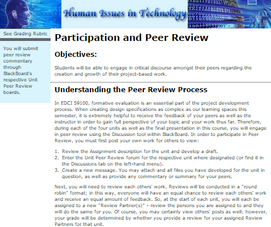Description
Peer review is a strategy steeped in the social interaction proposed as essential to cognitive development by scholars such as Bruner and Vygotsky (Price, O’Donovan, & Rust, 2007; Hughes, Ventura, & Dando, 2004). Peer review involves small groups or pairs of students sharing work with one another, creating an environment where students can develop expertise over time by learning from the variety of experiences and perspectives of others (Ge & Hardré, 2010). Through these interchanges and the exchange of knowledge and ideas, development increases for all participants, as students are encouraged to reflect upon their work and revise based upon new insights gained from others.
Online discussions do not lend themselves to rapid engagements due to their asynchronous nature (Hughes, Ventura, and Dando 2004); however, they do provide a chance for learners to take their time and share deeper thoughts than they might in a face-to-face setting. Wang (2010) found that online discussion can promote higher levels of engagement among learners, creating a more student-centered and open environment. Students are able to provide more substantive comments supported by their own ideas as well as cited literature, and they are also able to challenge one another and engage in extensive, insightful conversations about their ideas regarding effective learning space design. The social interactions that take place during peer review prompt development by causing shifts in how learners understand and internalize the content, helping them develop expertise in this area of instructional design (Ge & Hardré, 2010).
Link to example artifact(s)
Dr. Anastasia (Staci) Trekles (Purdue University North Central) uses peer review as an important activity throughout her graduate-level course, Human Issues in Instructional Design and Technology (EDCI 59100). Each assignment builds on the one before it, until the students have each completed a complex, research-based learning space design proposal for a fictional space of their choosing over a sixteen-week semester. Once students have constructed drafts of each stage of their proposals, students engage in an online discussion over a two-week period to critique each other’s work and offer suggestions for improvement. The asynchronous online medium gives them a chance to share various types of media, including videos, presentations, and documents, while also giving them the chance to post thoughtful, complete critiques. Students are placed into groups of three, and they must reply at least twice to the drafts of each of their peers within the group. With each new assignment and round of peer review, groups are rotated to expose all students to a variety of thoughts, ideas, and feedback perspectives.
Artifacts: The following links will take viewers to sample assignments and descriptions of the peer review process in Trekles’ EDCI 59100 course.
- Peer review structure: http://zelda23publishing.com/peerreview.htm?lipi=urn%3Ali%3Apage%3Ad_flagship3_messaging%3BheE67Io8Q3eQbg%2Fa6WnKRg%3D%3D
- Instructions for a sample assignment: http://zelda23publishing.com/learnenvdraft.htm?lipi=urn%3Ali%3Apage%3Ad_flagship3_messaging%3BheE67Io8Q3eQbg%2Fa6WnKRg%3D%3D
Link to scholarly reference(s)
Ge, X., & Hardré, P. L. (2010). Self-processes and learning environment as influences in the development of expertise in instructional design. Learning Environment Research, 13(1), 23-41. https://doi.org/10.1007/s10984-009-9064-9
Hughes, M., Ventura, S., & Dando, M. (2004). On-line interprofessional learning: Introducing constructivism through enquiry-based learning and peer review. Journal of Interprofessional Care, 18(3), 263-268.
Price, M., O’Donovan, B., & Rust, C. (2007). Putting a social-constructivist assessment process model into practice: Building the feedback loop into the assessment process through peer review. Innovations in Education and Teaching International, 44(2), 143-152.
Wang, C-. M. (2011). Instructional design for cross-cultural online collaboration: Grouping strategies and assignment design. Australasian Journal of Educational Technology, 27(2), 243-258. Retrieved from https://ajet.org.au/index.php/AJET/article/viewFile/968/242
Citation
Trekles, A. (2015). Foster peer review using online discussion. In B. Chen & K. Thompson (Eds.), Teaching Online Pedagogical Repository. Orlando, FL: University of Central Florida Center for Distributed Learning. https://topr.online.ucf.edu/foster-peer-review-using-online-discussion/.
